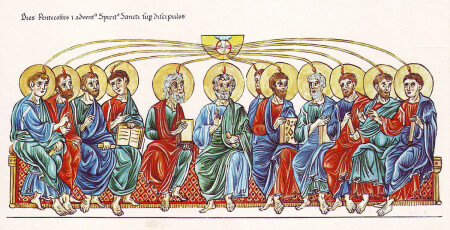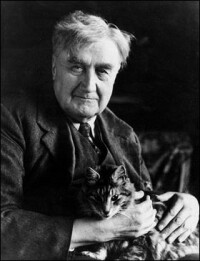Pentecost, in which the Director of Music talks about his cat
 This Sunday is one of the seven principal feast days in the Episcopal Church, the Day of Pentecost: Whitsunday. And it always makes me think about my cat. More on this later.
This Sunday is one of the seven principal feast days in the Episcopal Church, the Day of Pentecost: Whitsunday. And it always makes me think about my cat. More on this later.
I was recently heard about the concept of "sober inebriation" or "sober drunkenness of the Spirit" on a podcast I listen to called "The Liturgy Guys".
What this has to do with is with the work of the Holy Spirit. The Spirit should animate not only our music and liturgy but our whole lives as Christians.
There is no better day to consider this concept than the Day of Pentecost. In the story of Pentecost found in Acts chapter 2, bystanders assume the disciples are intoxicated: "But others sneered and said, 'They are filled with new wine.'"
This summer marks the 50th anniversary of the death of American composer Leo Sowerby (1895–1968), often called “the Dean of American church music.” Sowerby was Organist and Choirmaster at St. James Cathedral in Chicago before heading to the Washington National Cathedral. Among Sowerby’s many anthems is the plainsong-inspired Come, Holy Ghost for Pentecost. The organ accompaniment at the beginning of this anthem is derived from a plainsong melody associated with Pentecost: "Veni Creator Spiritus".
The anthem as a whole displays a kind of "sober drunkenness" because of its unusual time signature. The anthem is in five-four time (five beats in a measure). This kind of time signature is uneven. We tend to hear it as either a group of two followed by a group of three, or vice versa.
1 2 1 2 3
or
1 2 3 1 2
I think Sowerby's choice of this "off balance" time signature is deliberate for this music. It communicates the ecstatic joy that we read about in the Acts account of Pentecost.
French composer Olivier Messiaen (1908–1992) had synesthesia, a neurological condition that allowed him to “see” colors of sound. His remarkable communion motet O sacrum convivium presents a vivid spectrum of harmonies indeed, a veritable musical rainbow for the New Covenant found in the “sacred banquet.”
The concluding hymn (573) brings to mind the Tower of Babel (“building proud towers”), which is traditionally presented as the opposing narrative of the Day of Pentecost. If God's action of scattering the builders of the Tower of Babel was what created different languages, we see those differences overcome when everyone from every place can understand the words of the disciples in Jerusalem on the Day of Pentecost.
 Finally, a word about my cat. His name is Ampney.
Finally, a word about my cat. His name is Ampney.
The English composer Ralph Vaughan Williams (1872–1958) wrote the hymn tune that we sing for Hymn 516: "Come down, O Love divine". Vaughan Williams named this hymn tune for the English city in which he was born, Down Ampney.
(Get it? When he jumps up on something we get to say, "down, Ampney".)
Vaughan Williams also really liked cats, apparently. In this

